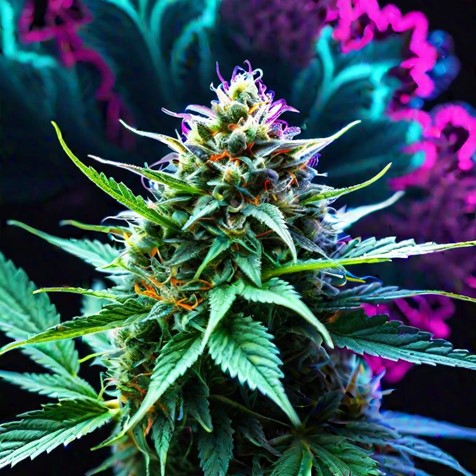“16 % of Americans now smoke marijuana, according to a recent Gallup survey. This was their highest reported percentage in the history of their cannabis questionnaires. In another survey done by the American Journal of Preventative Medicine, the number of Americans who use medical marijuana more than doubled from 2013 to 2020.”
Is the Cannabis Sativa plant a medicine for wellness?
At Holistic TherapeutiX, we believe it is. In this latest blog piece, we will be discussing why we believe that. We will also dispel much of the historical stigma surrounding cannabis.
In recent years, the perception of cannabis has experienced a radical shift. There is a clear change from its historical association of recreational use and a “rebellious”, or “counterculture” image.
16 % of Americans now smoke marijuana, according to a recent Gallup survey. This was their highest reported percentage in the history of their cannabis questionnaires. In another survey done by the American Journal of Preventative Medicine, the number of Americans who use medical marijuana more than doubled from 2013 to 2020.
Clearly, society is beginning to recognize cannabis’s many therapeutic uses, and its potential to contribute to holistic wellness. As clinical research into cannabis continues, it’s becoming harder to ignore cannabis’s effects on wellness.
The common stigma surrounding cannabis is fading, replaced by a growing acceptance and embracing of its healing powers.
This shift in perception is also affecting the legal landscape. Medical marijuana is now legal in 38 states and is legal in 24 states for recreational use.
It won’t be long before more states join in. As recently as October 2022, Only 1 in 10 Americans believe cannabis should not be legal in any capacity.
A False Stigma

“All ongoing research into cannabis and other psychedelics was halted, leading to a society where many people’s best treatment options became prescription drugs with worrisome addictive potential.”
Before we dive in to how cannabis is a bridge to wellness, let’s dispel the stigma.. We’ll also explore where the stigma originated from.
Cannabis has been classified as a schedule 1 drug by the federal government since 1970. In short, a drug marked as schedule 1 is defined as a drug with “a high potential for abuse… with no currently accepted medical use in treatment.” Research funds are rarely, if ever, granted to schedule 1 drugs.
The effects of this classification were far-reaching. Understanding the benefits of this plant was now going to be much more difficult. This restrictive and false categorization, coupled with the spreading of misinformation, maintained negative stereotypes. It also delayed clinical research into the therapeutic benefits of cannabis.
The stigmatization of cannabis reached a pinnacle during the era of the “War on Drugs”, started by the US government in the 1970s. This aggressive legal and propaganda campaign strongly reinforced existing stereotypes. For a time, the War on Drugs was effective. Cannabis, and other psychedelic drugs, were cemented in the public consciousness as a drug of criminality, addiction, and societal decay.
The impact of this propaganda campaign were severe. People who could have benefited from the cannabis found themselves instead seeking alternatives that were rarely ever effective.
At the same time, the environment became inhospitable for scientific exploration. Any possibility of us discovering the therapeutic potential hidden within the various compounds of cannabis was lost. All ongoing research into cannabis and other psychedelics was halted. Sadly, this meant many people’s best treatment options became prescription drugs with worrisome addictive potential.
Although the war on drugs was effective for a time, the tide is turning.
Many people are beginning to realize that their beliefs about cannabis were influenced by a mix of legal classifications, and intentional misinformation. It didn’t help that cannabis was not accepted by the culture at large. Nowadays, cannabis and other psychedelics are showing that they can help people quit addictions, not cause them.
With ongoing efforts to destigmatize cannabis, there is a push to review its stringent DEA classification and promote a more evidence-based categorization.
While the tide is beginning to turn, and more people can now access medical or recreational marijuana, there is still much to do. In some states, people still face jail time for possessing even just a few grams of cannabis.
One of the best things we can all continue to do is to learn about how cannabis can help wellness, and communicate what we learn with others.
With that being said, let’s now turn to how cannabis affects our holistic health.
The Healing Power of Cannabinoids
Any conversation about cannabis and its effects on wellness should begin with its chemical compounds. Cannabis contains a diversity of chemical compounds known as cannabinoids. Among these, two have garnered significant attention: tetrahydrocannabinol (THC) and cannabidiol (CBD).
THC is responsible for the plant’s psychoactive effects, while CBD is non-intoxicating and has various therapeutic benefits of its own.
These cannabinoids interact with the endocannabinoid system (ECS), a complex cell-signaling system in the human body. The ECS plays a critical role in regulating various physiological processes, including mood, sleep, appetite, and immune response. Due to its interaction with the ECS, cannabinoids can offer a variety of health benefits.
Both THC and CBD can positively affect your mood, sleep quality, stimulation of appetite, and how often you get sick. While research is still ongoing, and it is hard to say for certain what THC and CBD are safe and effective for, the anecdotal accounts continue to grow.
Cannabis for Holistic Wellness

“Cannabis is also an excellent enhancer of mindfulness practices. It is a drug that can help you slow down, be compassionately and curiously present, and face your worries from a place of calm and regulation.”
One of the most promising areas of cannabis research is the impact it can have on mental health.
Anxiety, depression, and post-traumatic stress disorder (PTSD) are common conditions that can significantly impact our well-being.
Many people find the traditional treatments for these conditions lacking, leading researchers and patients alike to explore alternative options like cannabis.
CBD has shown promise in treating anxiety, and easing some of the symptoms of PTSD. There is some evidence that THC can help alleviate depression. It should be noted that the anti-depressant effects were strongly correlated with dose
Some of the calming and anti-depressant effects of cannabis are due to its effects on serotonin receptors in the brain, a neurotransmitter linked to mood regulation. Cannabis is also an excellent enhancer of mindfulness practices. It is a drug that can help you slow down, be compassionately and curiously present, and face your worries from a place of calm and regulation.
In the first and second blog piece we wrote, we covered the benefits of mindfulness and how to incorporate them into daily life. As mentioned, cannabis is a powerful booster of mindfulness.
This in of itself makes cannabis a powerful tool for wellness, and combating mental health issues.
Pain Management and Inflammation
Chronic pain is a significant life affecting issue that over 50 million Americans suffered from in 2021. Unfortunately, most traditional treatments are not very effective, often come with neurological side effects, and pose a serious risk of addiction.
Cannabis is an exciting alternative for pain management.
Both THC and CBD have demonstrated analgesic properties. The just mentioned study on THC found that “peripheral nerves that detect pain sensations contain abundant receptors for cannabinoids, and cannabinoids appear to block peripheral nerve pain”. This shows cannabis’s potential for relieving pain associated with conditions such as:
- Arthritis
- Migraines
- Multiple Sclerosis
- Cancer
- The nasty side effects of chemotherapy.
Cannabis may also help reduce inflammation, a common thread in various chronic diseases. While not often talked about, inflammation may be at the heart of several chronic diseases such as:
- Diabetes
- Cardiovascular Disease
- Cancer
- Alzheimer’s
- Obesity
- HIV/AIDS
- Various Auto-Immune Diseases
While the research around the anti-inflammatory effects of cannabis is ongoing, the far-reaching effects of safe anti-inflammation medicine cannot be understated. With millions upon millions of people suffering from the ailments listed above, cannabis may be an opportunity to provide mass healing and relief.
While cannabis may not be able to directly treat all of the ailments listed above, it may be able to help prevent people from developing these serious diseases in the first place.
(Responsible use, dose, and quality of the cannabis medicine are all important factors if you are to use cannabis for these properties. We also want to quickly remind everyone that this blog piece is for informational purposes only and does not constitute medical advice. You should always speak with your doctor before trying any treatment, including cannabis.)
Other Wellness Benefits of Cannabis
“Due to effects of the War on Drugs, the clinical research world has just begun to embrace cannabis. As a result, clinical research on cannabis is in its infancy. There is a long way to go before there are enough studies for cannabis to begin being FDA-approved for many different therapeutic indications.”
Mental health and inflammation are two of the most important health problems that cannabis may help treat or ease the symptoms of.
While we won’t be going into as much detail for the following wellness benefits of cannabis, they are vast and include:
- Epilepsy:
CBD has become popular due to its ability to reduce seizures in certain forms of epilepsy. The FDA has approved a CBD-based medication for specific epilepsy syndromes.
- Sleep Disorders:
Cannabis may be able to help with certain sleep disorders, such as insomnia. Cannabis has a calming effect, suppresses arousal, and increases adenosine, a sleep-promoting chemical in our cells. As we mentioned earlier, cannabis also enhances mindfulness practices. Mindfulness is a powerful tool to achieve higher sleep quality on a more consistent basis.
- Cancer Treatment Support:
Nausea and Vomiting: THC, the psychoactive component of cannabis, has been used to ease nausea and vomiting in cancer patients going through chemotherapy.
Appetite Stimulation: Cannabis may help stimulate appetite, which can be helpful for people experiencing weight loss due to cancer or HIV/AIDS.
- Autoimmune Conditions:
Multiple Sclerosis (MS): Cannabis is being explored for its potential to relieve symptoms of MS, including muscle spasms and pain.
- Gastrointestinal Disorders:
Inflammatory Bowel Diseases (IBD): Some patients with Crohn’s disease and ulcerative colitis report symptom relief with cannabis use.
- Skin Conditions:
Eczema: Topical applications of cannabis-based products may have anti-inflammatory effects, potentially providing relief for certain skin conditions.
- Addiction Treatment:
Substance Abuse: Cannabis can help people struggling with substance abuse reduce their usage, especially opioids. Part of the reason for this is due to the pain-relieving qualities of cannabis. The pain relief cannabis provides rivals that of opioids and has a much safer risk profile.
- Athletic Performance and Recovery:
Muscle Recovery: Athletes are exploring cannabis for its potential in reducing inflammation and aiding in muscle recovery post-exercise. As mentioned above, cannabis may also help people with certain sleep disorders. High-quality sleep is crucial for muscle recovery and injury healing.
- Glaucoma:
Intraocular Pressure: While the number of people using cannabis for glaucoma has diminished due to more effective pharmaceutical options, it was historically used for its ability to lower intraocular pressure.
Due to the effects of the War on Drugs, the clinical research world has just begun to embrace cannabis as a wellness tool. As a result, clinical research on cannabis is in its infancy. There is a long way to go before cannabis shows enough clinical results to begin being FDA-approved for many different therapeutic indications.
However, as we have just spent time discussing, the early results are compelling. There is hope for a future with access to a medicine that is effective and safe.
When used responsibly, and with advice from a medical professional, cannabis can be a chameleon medicine; capable of providing relief from many different symptoms and ailments.
Breaking Chains, Building Bridges

At Holistic TherapeutiX, we believe that cannabis is more than just a recreational substance; we see it as a medicine for wellness and holistic well-being. In this blog piece, we wanted to shed some light on the historical journey of cannabis, and dispel a falsified stigma that has hidden its healing potential.
As we dove into the therapeutic benefits of cannabinoids, such as THC and CBD, we can see that they offer a variety of potential health benefits. Mental health stands out as a promising area, with cannabis showing promise in reducing anxiety, improving depression, and easing symptoms of PTSD. The calming and anti-depressant effects, coupled with its role as an enhancer of mindfulness, make cannabis as a powerful tool for improving mental health.
Beyond mental health and pain management, cannabis shows a range of therapeutic benefits. From epilepsy to sleep disorders, cancer treatment support, autoimmune conditions, gastrointestinal disorders, and even addiction treatment, the potential uses of cannabis are extensive.
As clinical research on cannabis is still in its infancy, there’s much to explore and understand. Yet, the early results are compelling. providing hope for a future where cannabis is recognized, embraced, and FDA-approved for a number of medical uses.
At Holistic TherapeutiX, we integrate cannabis into various holistic practices. From cannabis and breathwork sessions to conscious cannabis circles and yoga, each experience aims to harness the therapeutic potential of cannabis for holistic healing and self-discovery.
We invite you to embrace cannabis as a tool for wellness and embrace its potential for holistic healing.

